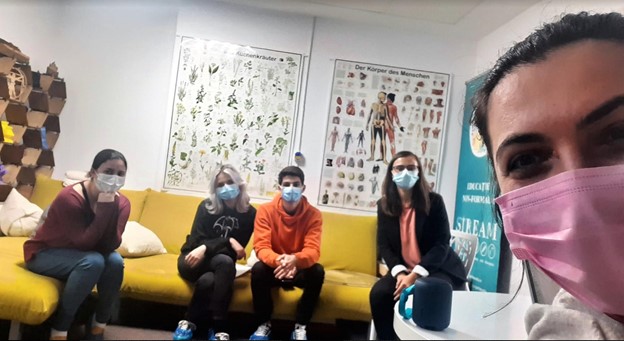Transdisciplinary teams for sustainable solutions
Lab 2: STEAM+ Sustainable Sea and City Challenge
PhD student Laura Frentescu Tordai, Faculty of Psychology and Education Sciences, AL.I.Cuza University, Iasi, Romania Contact:
Romania is a partner in the EU project STEAM+. The next activity in the project is an innovative lab nr 2, organized by the Lithuanian partner, Klaipeda University. In this lab, students and teachers with different disciplinary backgrounds and from 9 different countries worked together for 2 weeks. The challenge was to choose one or more sustainable goals and develop an innovative solution.
It is the beginning of November and I just found out that I will be a part of the Romanian team for the Klaipeda Lab.
The first exciting thing that happened was to get to know my teammates. These students had very different backgrounds from Physics, Informatics, Philology, Chemistry, Mathematics, Education and various experiences that were to be used in finding the best solution and present it in a short video.
My first reflections were: Would this heterogeneous team work? In such a short time ?
We were a team of girls, Tina (Philology and Education), Lidia (Chemistry), Alexandra( Physics) and me (Mathematics and Informatics). Georgiana, a Phd student in Computer Science also part of our team as well as Professor Dr. Sebastian Popescu who was always there with the right questions or examples.
An inventory of our diverse ”super-powers” was helpful as a start. What we know, what we can perform well and fast, these were important facts if it was to organize us and come up with a solution in less than two weeks. Actually, now I think, especially because of this diversity, we were able to complement each other so well.
In order to tackle powerful problems, I think, one needs a strong cocktail of skills.
But what was that powerful problem in fact?
I must say, at the beginning, we thought a sustainable solution was required for Klaipeda, so we embarked on virtual guided tours in this beautiful port of Lithuania, in our endeavor to discover it”s history and it”s challenges. Even if this turned out to be a detour, in this pandemic times, it was a pleasure to ”travel”.
In fact, the tour we ought to take was one that allowed us to observe, be more aware and prioritize problems in our own city, in Iași (Romania). Problems related to waste, recycling, transportation, energy consumption or health, problems that are causing us discomfort and need to be sustainably approached. We found many issues, so many that it was difficult to decide upon one of them. So this did not work out so fast for us.
Because in Iasi there are no good habits concerning the garbage management strategies, nor an optimal transportation system, friendly to bikers or pedestrians and even less usage of green energies, we decided that a good idea was to emphasize the educational side. We liked the idea of an app educating towards sustainability with information, examples, thematic tours or incentives for good deeds like biking instead of driving.
Once we decided on the winning idea, with the support and input from our coordinator, we started describing the solution we envisaged and this went very smoothly. Every skill in our diverse team was useful and put to work and even though the time pressure was high, we managed to successfully deliver our solution proposal for a better, greener and more sustainable Iași. Our diverse skills were very useful in terms of : what environmental issues in our city we should address, discussing about what this app should include, how to present the information, how to make people understand our message, creating the mobile app prototype, writing the script, translating,searching pictures, mixing music and processing the video. See link with our video.

When I look back, I am very proud of how our transdisciplinary team worked.
I also discovered with great admiration the solutions from the other project teams
The Klaipeda Lab experience made me think that sharing expertise from specialists in different fields can be used to design a coherent, common and innovative approach to change the things that need to be better in the world we live in. This is also the learning experience I would like to share,inspire and be able to replicate. My goal is: recruiting transdisciplinary teams of teachers and students in the university environment of Iași, to work on joint projects and ultimately to bring positive changes in society.
Working in transdisciplinary teams not only prepares students for real life challenges but it is also a great opportunity for preservice teachers to experience STEAM content and different problem solving situations. After all, teachers in schools have different backgrounds and according to research studies (see for ex. John Hattie), good collaboration between teachers has the strongest impact on pupils’ school performance.
There is no doubt, in my opinion,that learning in transdisciplinary teams can open up new ways of teaching and learning for higher education institutions. The question that remains is:
How can we envision, at University level, a method to maximize the benefits of transdisciplinary teams?
